Crew 217 EVA Report 11 Dec 2019 Ann Rockett EVA Date: Sol 2, 12-11-19 Start time for EVA: 9:00 am End time for EVA: 12:30 pm Weather was clear and sunny. Purpose of EVA: To investigate the presence of life in water found in potholes study. Green bands sample collection to bring back to lab for analysis and identification. Destination: Lith Canyon Cow dung road Dino quarry at Lith Canyon traveling by rover and on foot EVA Participants: Cynthia, Teresa, Kevin, Ann Narrative: EVA One (Ann, Cynthia, Kevin, Teresa) journeyed to Lith Canyon. One of MDRS’s absolute rules is that one stops when the Rovers’ battery reaches 60%. Do not pass go. Do not collect $200. Do not take the Rover further afield when the battery reads 60%. About two-thirds the way to Lith Canyon, Spirit’s battery read 60%. Not to be deterred, the astronauts continued with their mission, one Rover down. Failure was not an option. They successfully collected water samples from three separate potholes. They also took measured pH and temperature and took salinity readings They also scaped rock samples from four samples from the green sediment in the Morrison strata: one from above the green layer, one from the green layer, one from under the green layer, and one from a group of crystalline structures in the layer above the green layer. Finding themselves with over 60 minutes left in their EVA allotment of time, the group also collected gypsum samples at the Cow Dung Road/Moon Overlook Road junction.
Journalist Report – December 12th
Crew 217 Journalist Report 12 Dec 2019 Teresa Hislop Rockets, river beds, and rodents…. Our final day of sim started with a raucous rocket assembling party. The four rocket experts (Ann, Cynthia, Kevin, Hope) tutored the four rocket novices (Shannon, Atila, Teresa, Jen) and, in the end, four rockets were assembled, painted, and ready for an afternoon launch. The morning EVA took the six teacher explorers along a dry river bed, up a winding road, past Badlands-esque geologic vistas, and onto a plateau of literally littered with 150 million year old Devil’s Toenail (Gryphaea) fossils. The teachers took many fossils and more photos. After dusting the hike’s soil from their boots, the crew got their hands dirty when they planted succulents in pint jars. Each of the eight crew members made a mini-terrarium using a small cactus, 5-10 ml white gravel, and about 200 ml Mars simulant soil. From mini-terrarium to full size greenhouse, from Martian simulant soil to Earth-origined planting soil, the crew moved from the Hab to the greenhouse to plant, re-plant, and repair. During the night something ate all the zucchini, most of the peas, and several tomatoes. The once healthy plants disappeared at ground level. We suspect a rodent with a green tooth. Cynthia and Teresa replanted the munched plants, transplanted herbs, acorn pumpkin and peppers, thinned basil and cilantro, and planted lettuce and more cilantro. Atila hung planter pots out of reach of the rascally rodent, Atila and Kevin hung a shade screen, and Shannon crashed through an old bed. The day’s adventures ended with a BANG. Every missile was successfully launched and every missile was successfully recovered. Shannon’s happy dance reflected everyone’s happy mood. Life is good on Mars!!
Crew Photos – December 11th
GreenHab Report – December 11th
Crew 217 GreenHab Report - 11-12-2019 GreenHab Officer: Cynthia Hori Environmental control: Heating Shade cloth (40%) on Average temperatures Low 66 F High 90 F Hours of supplemental light :5 Daily water usage for crops: 80 L Daily water usage for research and/or other purposes: Water in Blue Tank— 300 gallons Time(s) of watering for crops: 7:30 pm Changes to crops: Pepper seedlings emerging growing quite well. Paper whites were rotated from top to bottom shelf. Getting more water and growing quite well Narrative: We didn’t get our work done today that we said we would. We have the Greenhab slated for tomorrow. A second shade cloth (30%) will be added tomorrow and squash will be transplanted. New lettuce seeds going in tomorrow. The herb garden is getting tall and the oregano is beginning to lift off of the soil and gain about 2 cm in height. Radishes may need to be thinned more. Harvest: none
Command Report – December 11th
Commander’s Report
11 Dec 2019
Shannon Rupert
It seems strangely familiar. Although I haven’t suited up for an EVA
in over a decade, the routine is the same. Slide flight suit on.
Well, this one doesn’t quite fit the way the last one I had put on
did. Instead of slipping into the oversized suits of the past, I pull
and tug and grunt as I squirm my way into a flight suit one size too
small. It was either this or steal the larger one from Atila, and
pride keeps me from doing that. Once the flight suit is on, I add the
radio. Earpiece, check. Radio with good battery, check. COMMS
check, check. I am ready. I chose the prototype for the one piece
suits, sometimes called the milk carton suits, for this EVA. It takes
three people to adjust it to fit me, because one shoulder strap,
incorrectly threaded, just keeps popping over and over. I can’t see
them, but I can feel them as they work on the suit. Finally, I feel
the strap tighten and stay that way, and I know someone has found a
way to fix it. Thumbs up. I’m ready now. Into the airlock. This too
seems familiar, something I am comfortable with. We wait until the
light goes off and are given permission to exit. I open the heavy
door and lift one foot, looking down. For one panicked second, I
hesitate, because this now seems strange. Whether from age or from
lack of practice, I worry that I won’t be able to walk. But I do. I
get to the rover and bump my suit a few times on the frame as I settle
in. I find myself in a reclining position as Jen starts the drive to
our EVA destination. I laugh as I sit there, getting flung from side
to side like a damn ragdoll. I spend the next twenty minutes trying
to get comfortable. I ignore the incredible Mars-like landscape we are
passing through. That I know like the back of my hand. What I don’t
know is how to get comfortable in this damn suit. Finally, I lean
forward and realize that there is a way to sit up straight. But it
comes at a price. When I sit up, the helmet pummels the hell out of
me. First my lip, then my teeth, then my lip again. And all the time
I am laughing, because what the hell do you do in that situation?
Finally, after what seems the longest rover ride of my life, we arrive
at the Moon overlook. I realize with delight that I am small enough to
just slither right out of the rover seat, and I’ve got my feet on
solid ground. We take a few fun photos, and then I head up the road to
scout for gypsum. I find a promising mound, then stop. I radio my
team “Do you think if I get down on my knees I will ever be able to
get up again?” I plop onto my knees and remember in a flash how hard
it is to collect samples when your vision is limited by the helmet and
your gloves make it difficult to pick things up. We gather some
gypsum and my team holds my hand so I can get up. We have two more
sampling sites, and as we head to the next one, I wonder why the sun
is getting so low in the sky. At the final sampling site I realize
that I had screwed up a long held rule at MDRS and I have scheduled
our EVA to end at sunset and not one half hour before sunset. That’s
what Atila had been trying to tell me, when I insisted the EVA go
until 5. We travel back to MDRS at a fast pace. Jen is enjoying the
hell out of driving the rover, but I am distracted by the way my
helmet keeps trying to punch me in the face. We park, enter the
airlock and in a few minutes I’ve put the murderous suit back on the
shelf. Both it, and I, will live to fight another day.
Journalist Report – December 11th
Crew 217 Journalist Report 11 Dec 2019 Author: Teresa Hislop “Failure is not an option” was today’s theme. There were no petri dishes in the science dome. Our research plans call for plating samples from two separate collections: gypsum samples collected at Moon Overlook and green sediment samples from the Morrison strata in Lith Canyon. Not be be deterred, we made “petri bags” by mixing agar and pouring it into zip log bags. Success! EVA One (Ann, Cynthia, Kevin, Teresa) journeyed to Lith Canyon. One of MDRS’s absolute rules is that one stops when the Rovers’ battery reaches 60%. Do not pass go. Do not collect $200. Do not take the Rover further afield when the battery reads 60%. About two-thirds the way to Lith Canyon, Spirit’s battery read 60%. Not to be deterred, the astronauts continued with their mission, one Rover down. Failure was not an option. They successfully collected water samples from three separate potholes. They also took measured pH and temperature and took salinity readings They also scaped rock samples from four samples from the green sediment in the Morrison strata: one from above the green layer, one from the green layer, one from under the green layer, and one from a group of crystalline structures in the layer above the green layer. Finding themselves with over 60 minutes left in their EVA allotment of time, the group also collected gypsum samples at the Cow Dung Road/Moon Overlook Road junction. While waiting for the radios and Rovers to recharge the group ground and plated the Morrison strata and gypsum samples. The gypsum samples were plated on 20% saline agar; the Morrison strata samples were plated on nutrient agar and incubated. EVA Two drove to Moon Overlook, stopping at three different locations to collect gypsum. They went out and back without incident but not without adventure. It was the first time in over 10 years Shannon had been in a space suit and the first time ever that she has ridden in a Rover in a space suit. Lesson and idea sharing continues. Today’s highlight is Jen’s Flipgrid app. She posts videos that her students view and respond to. She can see and respond to their responses. It is a fabulous way for asynchronous communication from “Mars” to Earth and back again.
Science Report – December 11th
Research Report 11 December 2019 Crew 217 – NSBU 217 Sol 2 Submitted by Science Officers Kevin Berean & Ann Rockett 1. Sharing of Mars and Space-related Classroom Activities: Crew members spent 4 hours on SOL 1 in a routable discussion sharing Mars and space-related classroom activities. Additional time has also been spent on SOL 1 and SOL 2 as the SIM unfolds discussing ways in which we can incorporate this firsthand experience into classroom lessons and activities. 2. Conducting a Biodiversity Survey of Ephemeral Potholes in a Mars Analog: Four crew members conducted an EVA on SOL 2 (that commenced at 10:15AM and ended at 12:30PM) and biodiversity samples were extracted from three ephemeral potholes at 4256500, 518500. PH and salinity readings were also taken and recorded for each pothole. Samples from Pothole 1 and Pothole 2 underwent a preliminary examination under a microscope in the MDRS Science Dome. Further examination of said samples will take place on SOL 3. 3. Investigating if Life Exists in a Green Layer of the Morrison Strata that is Exposed Throughout the MDRS Exploration Area: Four Crew Members conducted an EVA on SOL 2 (that commenced at 10:15AM and ended at 12:13PM) and samples were extracted from a green layer of the Morrison Strata at 4256500, 518500. Three samples were taken for investigation: sample 1 from the bottom of the green layer; sample 2 form the middle of the green layer; and sample 3 from the top of the green layer. All three samples were ground, plated and placed in the incubator at room at 27°C. 4. Search for Halophiles in Surface Gypsum: Gypsum samples were collected during the two EVAs today. Gypsum samples from the morning EVA (that commenced at 10:15AM and ended at 12:30PM) were collected on Cow Dung Road and ground and plated. Gypsum samples from the afternoon EVA (that commenced at 3:40PM and ended at 5:00PM) were collected at the Moon overlook. 5. Exploration of Ways to Communicate with Classrooms at MDRS. The crew continues to brainstorm ways in which future NSBU crews can communicate with classrooms during the SIM. Setting up a Flipgrid classroom is one way NSBU crews can communicate with classrooms during a SIM. In a Flipgrid platform, the NSBU teacher can post videos from MDRS during SIM to “the grid” that his/her students can access and watch via their established Flipgrid accounts. The students can then, in turn, post questions via video back to the NSBU teacher for his/her response. Students can also pose questions to each other via the Flipgrid. This method is currently being piloted and tested by one of our crew members and she has been able to post a video for her classrooms on SOL 1 and SOL 2, which has generated 18 question/reply videos from her students. The only issue that has surfaced using this method is the difficulty establishing an internet connection.
Operations Report – December 11th
Crew 217Operations Report 12/11/ 2019 SOL: 1 Name of person filing report: Hope Zubrin Non-nominal systems: radios Notes on non-nominal systems: radios still having charging issues and they all have new batteries Generator: Hours run: 12 From what time last night: 7:00 pm To what time this morning: 7:00AM List any additional daytime hours when the generator was run: n/a Solar— SOC 48 % (Before generator is run at night) Diesel Reading – 22% Station Propane Reading –not checked Ethanol Free Gasoline: 5 gallons Water (loft tank): 55 gallons Water Meter: 1467945 units Water (static tank): 425 gallons Static to Loft Pump used – yes Water in GreenHab: 300 gallons Water in ScienceDome: 0 gallons Toilet tank emptied: yes Deimos rover used: off campus Hours: Beginning charge: Ending charge: Currently charging: Sojourner rover used: ASSIGNED TO DIRECTOR Hours: Beginning charge: Ending charge: Currently charging: yes Spirit rover used:yes Hours: 118.0 Beginning charge: (Before EVA) 100 %; 100% Ending charge: (On return from EVA, before recharging) 42 %;38% Currently charging: Yes Opportunity rover used: off campus Hours: Beginning charge: Ending charge: Currently charging: Curiosity rover used: yes Hours: 123.3 Beginning charge:100%; 100% Ending charge: 50 %; 52 % Currently charging: yes Notes on rovers: ATV’s Used: (Honda, 300, 350.1, 350.2, 350.3) Reason for use:not used Oil Added? n/a ATV Fuel Used: zero gallons # Hours the ATVs were used today: Notes on ATVs: nothing to report HabCar used and why, where? No CrewCar used and why, where? In Grand Junction General notes and comments: Summary of internet: nominal Summary of suits and radios: all suits operational see radio notes Summary of Hab operations: nothing to report Summary of GreenHab operations: Nothing to report Summary of ScienceDome operations: Dissection scope needs repair. Many supplies needed: Petri dishes, sample cups, lab tape, sharpies, glassware, nutrient agar, scissors, and other consumables. Summary of RAM operations: nothing to report Summary of any observatory issues: nothing to report Summary of health and safety issues: nothing to report Questions, concerns and requests to Mission Support: nothing at this time.
EVA Report – December 11th
Crew 217 EVA Request 12-11-19 EVA #: 3 Today’s date: Sol 2 Requested EVA Date: Sol 3, 12-12-19 Requested start time for EVA: 10:00 am Requested end time for EVA:13:00 pm Weather is clear and sunny supporting the requested EVA. Purpose of EVA: To collect ancient invertebrates for presentation to students upon return to Earth. Destination: Walk from Hab up Sagan Street to Hab Ridge (destination) Coordinates: 518,000, 4251,300 UTM EVA Participants: Cynthia, Teresa, Kevin, Ann, Jen, Hope
Sol Summary – December 11th
Crew 217 Sol Summary Report 11Dec2019 Sol: 2 Summary Title: Mars needs teachers Author’s name: Atila Meszaros Mission Status: Second day on the red planet and rocking our mission goals. Sol Activity Summary: We started the day earlier, as we needed to cover a considerable amount of activities. The morning began with a double breakfast on my side and our first Biology class from our favorite Ecology teacher, Shannon Ruppert. The main objective of the day was to get 3 types of biology samples: gypsum from the Moon areas, water from pre-selected ponds and some fragments from the mysterious unidentified green layer. All of them were collected wonderfully. We aimed to plated them on agar so we would be able to determine qualitatively the biological content of them. In order to do that, we MacGyvered the agar making business and created (patent pending) the "Petry baggies". Today has been a wonderful day, I saw Shannon put a suit and go on an EVA for the first time ever, and you don't usually see that. I haven't been in sim for a while, but spending this week with wonderful people, one more inspiring and dedicated than the next one, it's really fulfilling. I haven't been in school for a long long time, but if I had one of these teachers for just a day when I was growing up, I would have definitely changed my life. Looking forward to seeing their work and how this experience will create new and better programs for their kids. Look Ahead Plan: Last day of the mission! We will start preparing the rockets for our afternoon EVA. Part of the crew will be doing the first last EVA to Hab Ridge during the morning. After lunch, we will be working on the GreenHab, planting and making a terrarium with Mars soil simulant. During the afternoon, small rockets wait for us to be launch And during the evening, we will try to wrap up the mission and spend our last night together. Anomalies in work: Nothing to report. Weather: Colder than yesterday, partly clear skies, light winds, and an impressive full moon. Crew Physical Status: Healthy, a little bit tired, but happy. EVA: Our first two long EVAs tackling our scientific goals: water holes, gypsum, and unidentified green layer sample return. Reports to be filed: Sol Summary, EVA Reports 3 & 4, EVA Request, GreenHab Report, Science Report, Operations Report, Journalist Report, and Photos. Support Requested: Science Dome materials and instruments (listed on the Science Report).
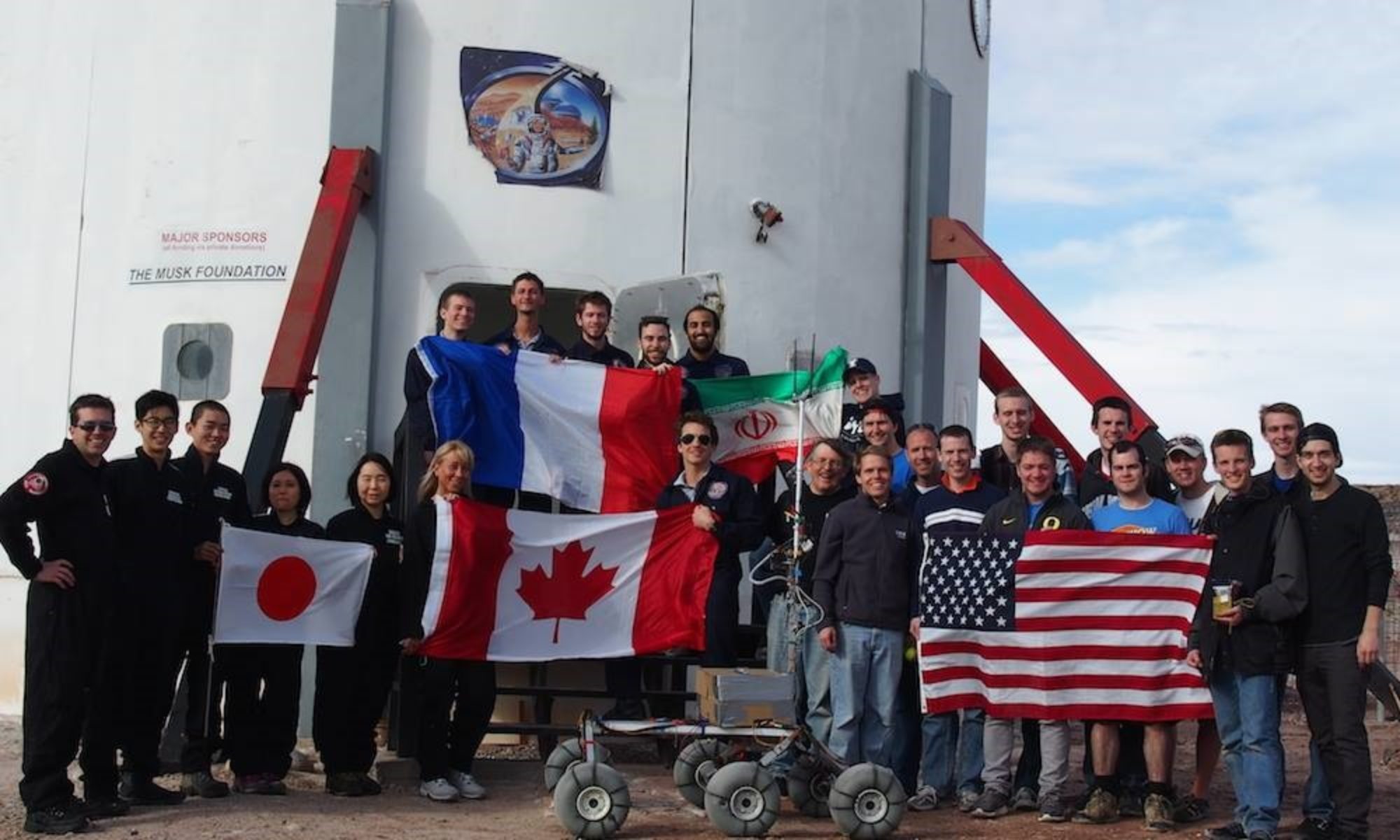
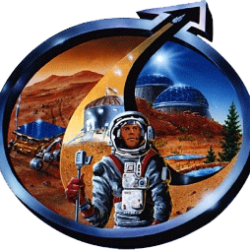
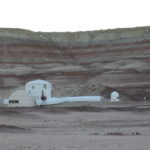
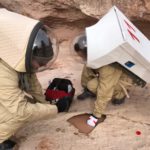
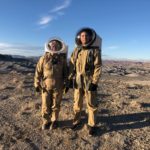
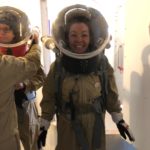
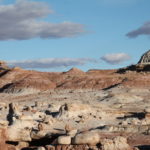
You must be logged in to post a comment.